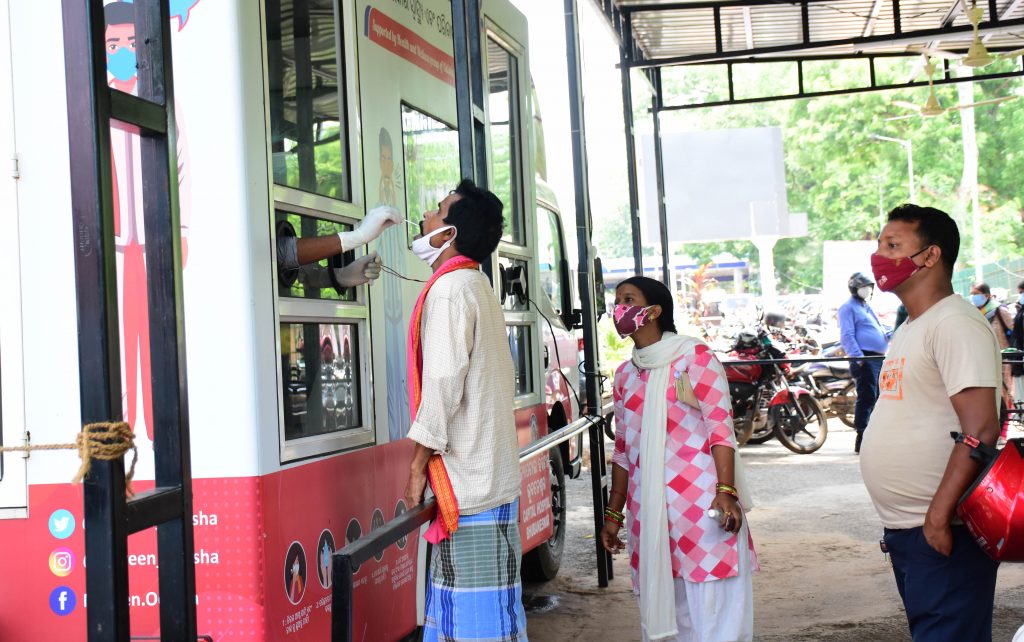Nikunja Bihari Sahu
While events like electioneering for Assembly polls, Kumbh Mela, Indian Premier League are being blamed for the sudden spurt of the second wave of the Covid-19 pandemic in India, the role of the triple mutant Delta variant of the virus behind the surge cannot be undermined. The strain, first detected in Bengal in last February, has now gone global raising concerns of a resurgence of the pandemic that could overwhelm the existing healthcare systems of the world and even potentially jeopardize the rollout of vaccines. Apart from hitting India, the strain is now poised to take hold of most of Europe and that too when many countries are considering to ease out restrictions on social gatherings and travel.
The Delta variant of Covid-19, scientifically termed as B.1.617.2, refers to an amalgamation of two mutant virus strains to give birth to a third super infectious strain. The Delta variant contains mutations from two separate virus variants, namely E484Q and L452R. What is really worrying is that the E484Q variant has been found to be a major immune escape variant.
An RNA virus, such as SARS-CoV-2, is made of nearly 30,000 base pairs of amino acids, placed like bricks adjacent to one another. An alteration in any of these base sequences could cause a sharp replication of the genetic structure leading to a mutation, effectively changing the nature and behaviour of the virus. The Delta variant contains multiple changes in the spike proteins of the original strain. Mutations in viruses are common. Like all viruses, the coronavirus keeps changing in small ways as it passes from one person to another in its transmission chain. However, while most mutations are insignificant, some others are really worrying because of their potential threats. According to a recent study conducted by the Public Health England (PHE), the Delta variant is around 60% more transmissible and likely more virulent, than the Alpha variant that has already caused havoc in Britain.
The World Health Organization (WHO) designated the Delta variant as the ‘Variants of Concern’ on May 10 due to its higher transmissibility and potential to cause more severe disease and evade antibody immune response system of the body induced by vaccines. The Delta variant was the fourth to be declared as a ‘Variant of Concern’ by the WHO; the others being B.1.1.7 first detected in Britain (commonly known as Alpha variant), B.1.351 first detected in South Africa (commonly known as Beta Variant) and P.1 first found in Brazil (commonly known as Gamma variant).
The Delta variant is not only more transmissible, but also more lethal. In India, it has resulted in 1.70 lakh deaths alone, which is nearly half of the total number of casualties in the country due to the pandemic. The variant has shown striking resilience against vaccines and, according to separate studies conducted by AIIMS (Delhi) and the National Centre for Disease Control (NCDC), the Delta variant can escape antibodies created from one or both the doses of the prevailing Covidshield or Covaxin jabs.
In yet another shocking development, the highly infectious Delta variant (B.1.617.2) has also mutated further in the K 417N portion of the spike protein to give birth to a more deadly version called AY.1 or Delta Plus variant. This variant is possibly capable of resisting even the monoclonal antibodies cocktail treatment of Casirivimab and Imdevimab types that recently gained popularity and received emergency use authorisation in the country as a cure. Similar to the natural antibodies, the monoclonal antibodies are artificially created in a laboratory to be tailor-made to defend the body from the infection of the disease. Although the variant has not been a cause of concern yet in India due to its low infectivity rate, yet it is feared to spark a third wave of the pandemic in many states including Maharashtra.
Understanding the continued evolution of the virus is of great importance in mapping the evolutionary pattern of emerging variants. Over the months, the virus has developed several new incarnations, and will continue to do so in future, by sequential acquisition of new mutations making it more lethal. As long as the virus is circulating in the body, the chance of new mutations is very high. Hence, it is important to break the chain of transmission of the virus in the first place to safeguard the world from the infliction of new lethal variants in coming days.
The writer is Education Officer, Regional Science Centre, Bhopal. Views are personal.
